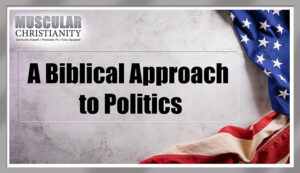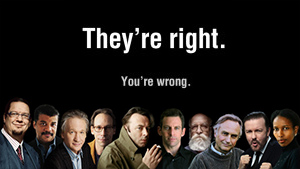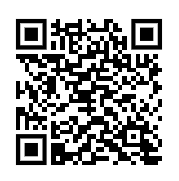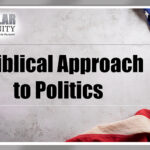A Biblical Approach to Politics | Part II
 I) Intro
I) Intro
In “A Biblical Approach to Politics | Part I,” we looked how God cares about Politics and He expects us to be engaged. To not be informed makes knowing what to pray for virtually impossible and to ignore the character of those who govern is to invite the kind of corruption that makes the “people groan. (Prov 29:2, 4)”
In Part II we’re looking at the challenge we face when attempting to discern the character of those who aspire to leadership positions as well as the seemingly illusive bottom lines when it comes to current events. Bottom line: The Bible says to “test the spirits” and we need to apply that to what it is we allow into our inbox by popping the hood, keeping your balance and kicking the tires.
II) Pop the Hood
Proverbs 9:13-18 says:
Folly is an unruly woman; she is simple and knows nothing. 14 She sits at the door of her house, on a seat at the highest point of the city, 15 calling out to those who pass by, who go straight on their way, 16 “Let all who are simple come to my house!” To those who have no sense she says, 17 “Stolen water is sweet; food eaten in secret is delicious!” 18 But little do they know that the dead are there, that her guests are deep in the realm of the dead. (Prov 9:13-18)
Compare that to Proverbs 1:20-23, 3:13-18:
Out in the open wisdom calls aloud, she raises her voice in the public square; 21 on top of the wall[a] she cries out, at the city gate she makes her speech: 22 “How long will you who are simple love your simple ways? How long will mockers delight in mockery and fools hate knowledge? 23 Repent at my rebuke! Then I will pour out my thoughts to you, I will make known to you my teachings… Blessed are those who find wisdom, those who gain understanding, 14 for she is more profitable than silver and yields better returns than gold. 15 She is more precious than rubies; nothing you desire can compare with her. 16 Long life is in her right hand; in her left hand are riches and honor. 17 Her ways are pleasant ways, and all her paths are peace. 18 She is a tree of life to those who take hold of her; those who hold her fast will be blessed. (Proverbs 1:20-23, 3:13-18)
What’s the difference between being wise and being smart?
The dictionary defines wisdom as “…knowledge, and the capacity to make due use of it.”1 The Bible takes it a step further by saying that, “The fear of the Lord is the beginning of wisdom, and knowledge of the Holy One is understanding.” (Prov 9:10)
How does that work? How does an appropriate reverence for God translate to wisdom?
Apart from the way a fool will ultimately deny the Reality of God (Ps 14:1) and the need for God’s grace (Rev 20:15), you also have the practical side of wisdom to consider in that you’re like the tree referenced by David in Psalm 1 as far as how everything they do prospers (see sidebar).
And part of why they prosper is because they’re prudent and they give careful thought to their ways.
Proverbs 14:15 says:
The simple believe anything, but the prudent give thought to their steps. (Prov 14:15 [see also Prov 6:6-11; Matt 25:16])
Fact is, in light of our struggle always being defined in the context of a spiritual contest (Eph 6:12), “testing the spirits” like what Paul says in First Thessalonians is going to apply not only to points of doctrine, but to everything that we encounter as human beings (2 Cor 9:8):
20 Do not treat prophecies with contempt 21 but test them all; hold on to what is good, 22 reject every kind of evil. (1 Thess 5:21-22)
Finally, in 1 John 4:1 we hear John saying the same thing we just heard Paul mention:
Dear friends, do not believe every spirit, but test the spirits to see whether they are from God, because many false prophets have gone out into the world. (1 Jn 4:1)
While listening to a cable news broadcast may seem like it falls under a different category than what John is referring to as far as “false prophets,” remember that however innocent or nondescript something may appear to be, consider what it says in Proverbs 24:
I went past the field of a sluggard, past the vineyard of someone who has no sense; 31 thorns had come up everywhere, the ground was covered with weeds, and the stone wall was in ruins. 32 I applied my heart to what I observed and learned a lesson from what I saw: 33 A little sleep, a little slumber, a little folding of the hands to rest—34 and poverty will come on you like a thief and scarcity like an armed man. (Prov 24:30-34)
You wouldn’t think Solomon, as wise and as powerful as he was, would’ve ever even considered betraying the One Who was the Source of his grandeur, but incremental compromises ultimately culminated in what you read in 1 Kings 11:5, as far as how his wives convinced him to worship Ashtoreth (ASH-toh-rith) and Molech (MOH-lek) – Molech being the god who demanded that you burn your children alive in order to appease him.
It’s not something obsess over, but it is a healthy reminder to be diligent – not just in personal matters but even in the way you process the things that are going on around you.
Little compromises, incomplete information, a biased perspective – you want to pop the hood on every bit of it in order to ensure your convictions are sound and your steps are appropriately “ordered.” (Ps 37:23)
So, how does one “test the spirits?”
III) Keep Your Balance
John says that you tell who’s who and what’s what by looking to see which “spirits” are willing to acknowledge Jesus as Lord:
This is how you can recognize the Spirit of God: Every spirit that acknowledges that Jesus Christ has come in the flesh is from God, 3 but every spirit that does not acknowledge Jesus is not from God. This is the spirit of the antichrist, which you have heard is coming and even now is already in the world. (1 Jn 4:2-3)
When attempting to discern the bottom line where a particular headline is concerned, while some commentators will make public their religious convictions, not everyone does. So, how do you navigate Politics? How do you establish some bottom lines where COVID-19 is concerned or “Black Lives Matter?”
Ecclesiastes 7:16-18 says this:
Do not be overrighteous, neither be overwise—why destroy yourself? 17 Do not be overwicked, and do not be a fool—why die before your time? 18 It is good to grasp the one and not let go of the other. Whoever fears God will avoid all extremes. (Ecc 7:16-18)
This is where we get into the dynamic of what you allow into your inbox.
Consider the following:
Experts Doubt the Resurrection of Christ
All of Israel is caught up in the rumors pertaining to the supposed resurrection of Jesus of Nazareth, a religious and political criminal that was recently put to death. While some are insistent that he is, in fact, alive, there are many others who dismiss it as yet another attempt being made on the part of his followers to validate his claims that he was the Son of God. We sat down with several high ranking officials, both from the Jewish and the Roman institutions that championed what was a very difficult, yet just, decision to get their thoughts.
From the very beginning, the Nazarene who referred to himself as the Son of God, was a problem in the way he incited many Jews to question the Law and their own heritage. His exploits weren’t curious as much as they were damaging, though many of those who heard him speak were unaware of just how toxic his perspective was. Thankfully there were steady and committed hands ready to prevent his corrosive effect from spreading by publicly questioning him and revealing his true colors.
“We challenged him,” said Simon, one of our more prominent Pharisees. “We demanded that he validate his testimony concerning himself and he wasn’t able to do it. (John 6)”
“His illegitimacy is no secret,” says Reuben, an associate of Simon and with him while they were questioning Jesus. “His mother was a disgrace and to see him now trying to assert himself as being equal to Jehovah is not only ludicrous, it’s almost sad to see someone so desperate to cover up the scandalous and unlawful aspects of his birth. (Mk 6:3)”
Clavius, a familiar tribune who serves Rome and has been an advocate for our Jewish traditions on many occasions, has no trouble being critical of Jesus.
“I remember a servant who lived in the household of one of my centurions who was deathly ill,” said Clavius. “He asked the Christ to come and heal his servant and this Jesus, who is supposedly compassionate, never even came to his home. I remember hearing that and from that moment forward, I was convinced that he was a problem and a fraud. (Matt 8:5-13)”
Atticus is yet another distinguished Roman, having served in the Roman army for two decades and a veteran of many conflicts. He was one of the guards who were stationed at the site of the Christ’s tomb (Matt 27:62-65).
“It’s insane!” he said. “I’ve been around death more than once. Jesus died. He’s dead. It might make you sad, but that doesn’t change the fact He’s gone. And I know what it is to grieve, but to see this rabble refuse to accept the death of their cause and their champion by inventing this ridiculous story that he ‘rose from the grave’ is nothing more than a crazy effort to not accept the fact that your Christ is no more, and you need to move on.”
When asked about the way in which the Pharisees were accusing the disciples of having stolen Christ’s body in order to give the appearance of Jesus having risen, Atticus said, “Your readers need to know that the disciples are lying! There is no resurrection. They broke the seal, they violated the sovereignty of Rome, they’re a stench among their own people…they’re insane! (Matt 28:11-15)”
Among those who insist that he rose is a former small business owner named Peter. As a fisherman, your fortunes are limited by default. Perhaps that’s why the prospect of becoming one of the Christ’s followers appealed to him to the point where he abandoned his craft and his family (Matt 8:14-18; 1 Cor 9:5). Maybe in the context of aligning yourself with someone who challenges the governing authorities could lead to a more prominent and financially sound position. Whatever his motivation was, his resolve to promote the fantasy of a risen “Messiah” is still very much intact.
“I’ve seen him!” said Peter. “I’m ashamed to admit that during his arraignment and trial, I denied even knowing him – I was that determined to put as much distance between myself and my former teacher as possible (Matt 26:73-75).”
“But that all changed when I saw him,” Peter said. “He’s alive and I’ll stake my life on it (Acts 4:18-19).”
Peter’s passion is admirable, but does that passion negate the testimony of hundreds of eye witnesses let alone the sworn statements coming from established and reputable Roman officials and Jewish authorities?
“There is something both healthy and beneficial in retreating from emotionally charged declarations and instead cling to the certainty of one’s spiritual heritage,” said Simon. “We obey the political authorities that God has instituted, and we revere the Law He gave to Moses. This is my stance and I hope it is one that our people will adopt as well.”
You can be honest without telling the truth. You can be ethical and still be sinister.
By emphasizing certain aspects of the story and casting a shadow of doubt on specific personalities, you can manipulate your readers’ perspective so they’re not only embracing the conclusion you would have them arrive at, but they’re also perceiving anyone who thinks differently as being either hateful or frightened.
In many cases, the dissemination of information is more about tactics than it is topics.
In the movie, “The Social Network,” there’s a scene where an attorney shows Mark Zuckerberg just how easy it can be to sway a jury without having to produce any evidence or even have a reason to doubt the answer to a particular question. But just by asking the question, you can distract from what’s relevant and initiate a thought process that’s willing to believe something despite the necessary evidence needed to validate it as being true being completely absent.
(Marilyn Deply [attorney]) I’ve been licensed to practice law for all of twenty months and I can get a jury to believe that you planted the story about Eduardo and the chicken. Watch what else: Why weren’t you at Sean’s sorority party that night?
(Mark Zuckerberg) You think I called the police?
(Marilyn Deply [attorney]) Doesn’t matter. I asked the question, now everybody’s thinking about it. You’ve lost your jury in the first 10 minutes.
What this scene demonstrates is the way in which your mind can be influenced to ignore what amounts to a comprehensive collection of the facts and instead focus on what is made to stand out as being the only logical bottom line.
And it’s not hard to do…
Oftentimes the only thing needed is to make your audience question your opponent’s character. If you’re successful, there’s nothing that can come from their mouth or their pen that won’t be immediately processed as something bogus.
They did it with Paul:
For some say, “His letters are weighty and forceful, but in person he is unimpressive and his speaking amounts to nothing.” (2 Cor 10:10)
… they did it with Christ:
The Son of Man came eating and drinking, and they say, ‘Here is a glutton and a drunkard, a friend of tax collectors and sinners.’ But wisdom is proved right by her deeds.” (Matt 11:19)
…and they do it today.
IV) Conclusion
There’s any one of a number of topics that are being constantly presented using this approach where more time is spent assaulting a person’s character than they do engaging their content.
This is but one tactic and we’ll look at some more next week, but however misleading things can potentially be, the question remains: How do you overcome it?
You keep your balance.
In the passage we looked at a moment ago, the last piece says, “It is good to grasp the one and not let got of the other. Whoever fears God will avoid all extremes.“

When you’re confronted with a question or an issue, the resources you allow into your inbox that you default to in order to understand what’s going on may represent a comprehensive analysis, they may not. The key is to ensure that you’re looking at all the facts according to their academic merit and not the way in which they’re made to be associated with certain personalities that have been characterized as either fools or fiends.
Balance.
Grasp the one and do not let go of the other.
Give thought to your steps and be diligent in ensuring that you’re processing yourself and the world around you according to a wise assessment as opposed to a quick impression.
For example, did you know we won the Vietnam War?
I’m not kidding.
I didn’t.
I served for nine years in the USMC with several who were combat vets. I remember as a kid the bumper stickers and the bracelets that were circulated during the seventies to remind people that we had POWs still over there…
It was always viewed as a bit of a tragic debacle.
If you try to find any information on what it is I’m getting ready to elaborate on, you’re going to run into some difficulties.
Try doing a search for “vietnam war victory day” and you’ll get articles about the fall of Saigon and “Reunification Day.”
But if you do a search for January 23, 1973, you’ll get the information you need in order to better understand why Vietnam was a war that we did indeed win.
You can watch a video about it by clicking here. The gist of it was that Nixon launched an aggressive bombing campaign against industrial and military targets in Hanoi with the condition that the bombing would stop if the North Vietnamese would agree to talk peace at the Paris Peace Accords.
North Vietnam finally agreed to Nixon’s offer and on January 23, 1973, an announcement was made that an agreement had been initialed by the North Vietnamese, the Viet Cong, South Vietnam and the United States.
It was proclaimed as “Victory in Vietnam Day!”
We had won!
The nature of the peace agreement was that the hostilities would end and that South Vietnam would be recognized as a sovereign nation by the North Vietnamese. Should the North Vietnamese initiate any kind of military action, the United States promised to match South Vietnam’s response bullet for bullet, man for man.
But then Watergate happened.
Nixon resigned in disgrace and the Democrats smelled blood. They ran on a platform that denounced the war as a waste of resources. Gerald Ford appeared before Congress and pleaded with them to remain faithful to the promise made to South Vietnam, but the opportunity to win the Oval Office was too great, and Congress refused. Not long after, Saigon fell and the victory that was both true and legitimate was erased from the history books and Jimmy Carter was elected as our new President.
However shameful it may be to see the honor and the sacrifice of the American military so casually removed from the public conscience just so a particular party can regain a superior political position, what’s even more despicable is the way in which those in charge of crafting the headlines and creating our school’s curriculum made a point of ignoring the practical reality of VV Day (Victory in Vietnam Day).
This is part of what makes informed conversation so challenging. You have in place a media staffed by some who are determined to minimize certain facts that make a difference in the way, not only America appears, but also how Truth is defined. Over a period of time, the abundance of “chanted information” (questionable conclusions repeated over and over again by the media until they become a collection of accepted facts) makes locating a more holistic perspective not only more challenging, but also more controversial.
To read “A Biblical Approach to Politics | Part III,” click here. To read Part I, click here.
1. Webster’s 1913 Dictionary, “Wisdom”, https://www.webster-dictionary.org/definition/Wisdom, accessed February 9, 2022
















Leave a Reply
Want to join the discussion?Feel free to contribute!